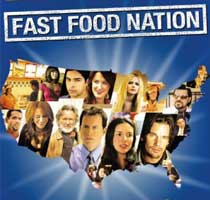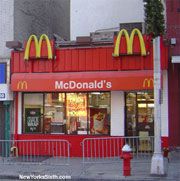Fast food nation《快餐帝国》(精讲之四)
影片对白

Don: Yeah. Hi there. I'm Don.
Rudy: Climb on over. Ever been out here before?
Don: Nope. It's beautiful.
Rudy: You ever been on a ranch before?
Don: Yeah, when I was a kid, at camp. How, uh- how many acres do you have, Rudy?
Rudy: Well, you wouldn't want to have to walk your way outta here. That's for sure. Come on up and meet my new neighbors.
Don: Aw. No. Aw, geez. When did all this happen?
Rudy: Last couple of years. Local rancher lost control of the land. Banks took it and sold it to real estate speculators.
Don: What the hell happened over there?
Rudy: Meth freaks.
Don: Out here?
Rudy: They find a quiet little place, start cookin'- till somethin' blows up or burns down.
Don: Wow.
Rudy: Past year and a half, I've had two bodies dumped on my land.
Don: Dead bodies?
Rudy: One of'em was rolled up in this nice-lookin' carpet. Scared the shit out of my foreman. They dump dead dogs and cats and all other sorts of garbage on my land. Seems like I spend half my time just defendin' the place. I gotta go to court next week to fight off some private corporation from Denver wants to build a toll road across my land. Eminent domain, my ass. They got another word for it-robbery. You wanna open that up for me?
Don: You should get a clicker. Hey, Rudy. You know anybody over at Uni-Globe Meat Packing?
Rudy: Sure.
Don: What do you think of'em?
Rudy: I think they're a fine bunch.
Don: Really?
Rudy: They'll slit your throat for a nickel. Nothin' personal. They just want the extra nickel.
Don: Well, who do you know over there?
Rudy: I know all of'em. I sold cattle to 'em for years.
Don: Oh.
Rudy: More important, I know their type. They are the meanest, toughest sons of bitches, and they're proud of it. But that's nothin' new. My granddad went up against the meat packers in 1919. Testified in Congress about their price-fixing. And after that, none of them would buy his cattle. U.M.P. And all the rest tried to run him out of the business.
Don: Okay, but that was a long time ago.
Rudy: Yeah. And the big packers are even worse today. They're even bigger today.
Don: Really?
Rudy: And meaner. Hell, old Dwight D. Eisenhower would've shut 'em down. He wouldn't have stood for their crap.
Don: Do you think they would knowingly sell us contaminated meat?
Rudy: Oh, come on. Workers are gettin' their arms cut off over there. You don't know who you're dealin' with.
Don: No. No, I don't. Please, help me. I- I was at the plant. It seemed clean to me.
Rudy: They show you the kill floor?
Don: I don't know. I saw a lot of things.
Rudy: You'd remember. You see any cattle gettin' their heads cut off? Were you walkin' ankle-deep in blood?
Don: No.
Rudy: So they didn't show you a damn thing.
妙语佳句,活学活用
1. Real estate speculator 地产投机者
2. Meth freak 吸食冰毒的瘾君子
Meth 是俚语,指的是methamphetamine (甲基苯丙胺,脱氧麻黄碱),即俗语中所说的“冰毒”。Freak 在俚语中则指“吸毒者,吸毒上瘾者”。
3. Blow up
Blow up 在这里的意思是“爆炸”,如:The bomb blew up.
4. Scare the shit out of someone
这个片语的意思是“吓某人一跳,吓坏某人”,因为有shit,这是个很粗俗的俚语,除了很亲密的朋友外,最好不要讲哦。例如:That murderer really scared the shit out of me.
5. Toll road
美语,意思是turnpike 高速公路(尤指收费的那种)。
6. My ass
这是个感叹词,意思是“天啊”,作用和 “Oh, dear!,Oh, my God,geez” 差不多。
7. Run someone out of
这个片语的意思是“To put out by force; compel to leave逐出”,例如:We ran him out of town.
8. Stand for
Stand for 在这里的意思是“Put up with, tolerate容忍,忍受”,通常是表示贬义的,例如: Mother will not stand for rude behavior.
文化面面观
争论:Criticism of Fast Food

Despite the widespread popularity of fast food in modern American culture, critics abound. Since the 1930s, articles and books have condemned the industry, exposing allegedly poor sanitary conditions, unhealthy food products, related environmental problems, and unfair working conditions. Whether it warrants the attention or not, the fast-food industry is still regularly cited for exploiting young workers, polluting, and contributing to obesity and other serious health problems among American consumers. American beef consumption, and more specifically the fast-food hamburger industry, is often blamed for the burning of the Amazon rain forests to make way for more grazing lands for beef cattle. Early foes of fast food cited the deplorable filth of many hamburger stands, in addition to claiming that the beef ground for their sandwiches was either spoiled, diseased, or simply of low quality. In fact, many critics maintained that much of the meat used in fast-food hamburgers came from horse

carcasses. The high fat content of fast food was also controversial. Despite deceptive industry claims about the high quality and the health benefits of their products, in the 1920s and 1930s concerned nutritionists warned the public about the medical dangers of regular burger consumption. This distrust and criticism of fast food continue today, extending even further to include dire warnings about the industry's use of genetically modified and antibiotic-laden beef products. Most major chains have responded to recent attacks by prominently posting calorie and nutritional charts in their restaurants, advertising fresh ingredients, and offering alternatives to their fried foods. Despite a few more health-conscious items on the menu, fast-food chains now aggressively advertise the concept that bigger is better, offering large "super-size" or "biggie" portions of French fries, soft drinks, and milkshakes. Critics point to this marketing emphasis as a reason for an excessive and greatly increasing per-capita caloric intake among fast-food consumers, resulting in fast-growing rates of obesity in the United States.

Increased litter is another problem that critics have blamed on the fast-food industry. Selling their products in paper wrappings and paper bags, early outlets created a source of litter that had not previously existed. Wrappers strewn about city streets, especially those close to fast-food restaurants, brought harsh criticism, and often inspired new local ordinances to address the problem. Some municipalities actually forced chains to clean up litter that was imprinted with their logos, but such sanctions were rare. Fast-food wrappers became part of the urban, and later suburban, landscape. Since bags and wrappers were crucial in the delivery of fast food, the industry as a whole continued to use disposable packaging, superficially assuaging public criticism by providing outside trash receptacles for the discarded paper. Years later, environmentalists again attacked the industry for excessive packaging litter, criticizing both the volume and the

content of the refuse. By the early 1970s, the harshest criticisms focused more on the synthetic materials used in packaging, and less on the carelessly discarded paper. Critics derided the industry's use of styrofoam (泡沫聚乙烯) sandwich containers and soda cups, claiming that these products were not sufficiently biodegradable and were clogging landfills. Facing mounting opposition from a growing environmental movement, most of the major chains returned to packaging food in paper wrappings or small cardboard boxes.
Labor activists have criticized fast-food chains' tendency to employ inexpensive teenage workers. Usually offering the lowest possible wages, with no health or retirement benefits, these restaurants often find it difficult hiring adults for stressful, fast-paced jobs. Many critics claim that the industry preys on teenagers, who will work for less pay and are less likely to organize. Though these accusations may have merit, the industry's reliance on teenage labor also has inherent liabilities, such as a high employee turnover rate, which result in substantial recruiting and training costs. Companies have countered criticism about their use of teenage workers with the rationale that they offer young people entry-level work experience, teaching them: both skills and responsibility. (answers.com)
考考你
用今日所学将下面的句子译成英语。
1. 吉姆担心他做的实验会把实验室给炸了。
2. 别那么大喊大叫——你吓死我了!
3. 我真不敢相信你能忍受这群淘气的孩子。
Fast food nation《快餐帝国》(精讲之三)考考你 参考答案
1. 猫咪悄悄地向那只鸟爬过去。
The cat crept up on the bird.
2. 他终于成功了。
He finally hit a home run.
3. 你不知道你在说什么——根本就是胡说八道!
You don't know what you're talking about — you're full of shit!
4. 所有较大的孩子都离开去跳舞了。
All the older kids have split to go dancing.
相关文章
- Million dollar baby《百万美元宝贝》精讲之三
- Million dollar baby《百万美元宝贝》精讲之二
- Million dollar baby《百万美元宝贝》精讲之一
- The princess diaries《公主日记》1 精讲之六
- The princess diaries《公主日记》1 精讲之五
- The princess diaries《公主日记》1 精讲之四
- The princess diaries《公主日记》1 精讲之三
- The princess diaries《公主日记》1 精讲之二
- The princess diaries《公主日记》1 精讲之一
- From the earth to the moon《从地球到月球》精讲之五




 手机网站
手机网站